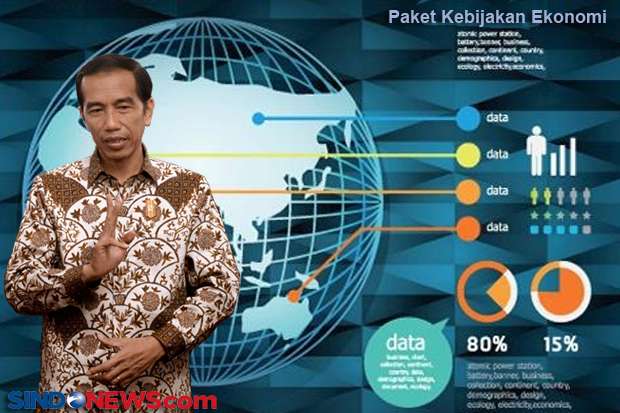Economy of Jokowi’s Era Weakens, Who Said?
By: Latitude Mahardika *
Even though it was hit by various issues, the economy in Indonesia will continue to deteriorate, the government will continue to strive to improve the economic sector with various policies. One of the policies produced is the government’s efforts to simplify regulations and provide an efficient and easy business licensing platform. This is intended to make investment grow in Indonesia.
The regulation turned out to get a positive response from Moody’s Fitch and Standard Poor, which stated that Indonesia was an Investment-worthy country in 2018, where S & P last gave decent investment status in 1992. This was a positive impact from the government which continued to create economic policies to encourage Indonesia’s investment rating.
The Central Statistics Agency (BPS) recorded Indonesia’s economic growth in Quarter IV-2018 of 5.18 percent. Higher than quarter III-2018 which amounted to 5.17 percent.
“Indonesia’s economic growth year on year in quarter IV-2018 grew by 5.18 percent,” said head of BPS Suhariyanto in a press conference at the BPS Central Office.
This growth is a pretty good achievement. Because, in 2018, economic turmoil is quite disturbing the rate of growth of a number of developing countries.
Rhenald economic observer Kasali sees a change in economic patterns in Indonesia. According to him, under the leadership of President Joko Widodo, economic growth in Indonesia can be felt from below. In 2018 it was a breath of fresh air for MSME Micro Small and Medium Enterprises. The competitiveness of SMEs is expected to increase so that they are able to participate in formal business activities.
In PP No. 23 of 2018 concerning income tax from businesses received or obtained by taxpayers who have certain gross circulation, the government cuts the income tax on MSMEs from 1% to 0.5%. The existence of this policy will certainly give the spirit of UMKM to develop. To facilitate businesses in obtaining credit / financing from Financial Institutions, the Government through the Coordinating Minister for Economic Affairs decided to reduce the KUR interest rate in 2018 from 9% effective per year to 7% effective interest per year.
The special KUR ceiling is set at Rp. 25 Million – Rp. 500 Million for each individual group member. Later the policy committee will set the KUR ceiling amount for 2018 for each KUR distributor, taking into account the recommendations of the Financial Services Authority (OJK).
“It’s not like in the past from above, through conglomerates and so on, but more on rural economies, MSMEs. That the so-called unicorn is economic orchestration in a new way, so that people’s participation can be accommodated, “said Rhenald.
Rhenald said that currently the eyes of the world are highlighting Indonesia, which is caused economically, Indonesia is experiencing very good growth. He also said that the simultaneous elections in April 2019 will have to be an arena that is enjoyed by all groups. 2019 elections, it should not be a campaign that hurts each other. But on the contrary, the 2019 democracy campaign or party must foster trust in the Indonesian economic revival.
Under Jokowi’s leadership, the construction of transportation infrastructure in the form of toll roads, airports, and ports on a small, medium and large scale. In addition, Jokowi also has concerns about village development, where there are hundreds of thousands of kilometers of village roads and additional village markets to basic infrastructure in trade and health such as posyandu. In the face of the Industrial Revolution 4.0, President Jokowi has a stake in improving human resources (HR).
This is based on the fact that one of the country’s assets is the wealth of knowledge, the strength of Indonesia in the economic sector must be directly proportional to the quality of educated human resources. BPS noted that the number of drop-out children in primary education decreased significantly, from 60,066 in 2016 fell to 32,127 in 2018.
The government has issued a policy related to the PIP Indonesia Pintar program, where with the program, the people who come from disadvantaged groups can complete 12-year compulsory education. This certainly indicates that President Jokowi is a visionary leader in advancing Indonesia in the economic sector.
- The author is an observer of economic issues
